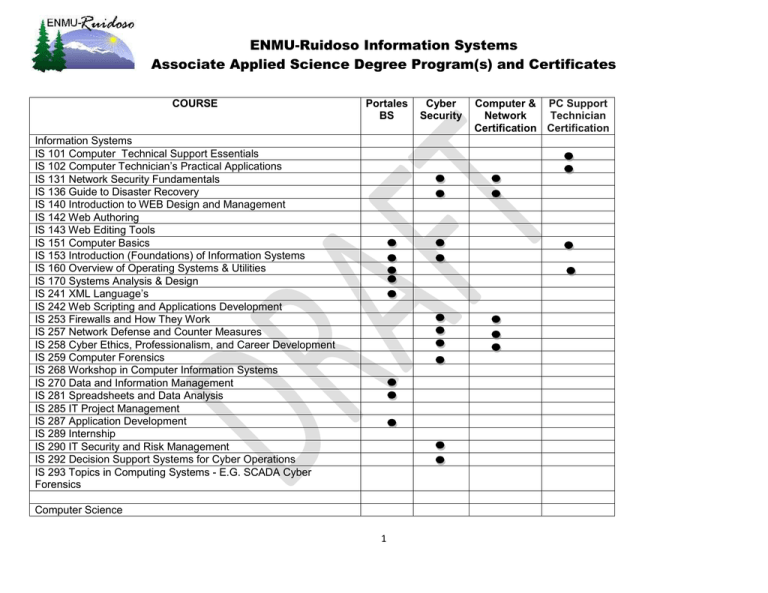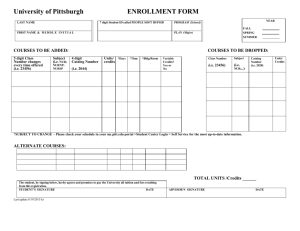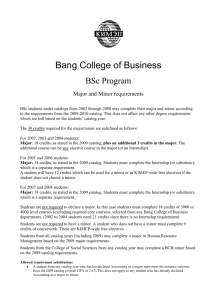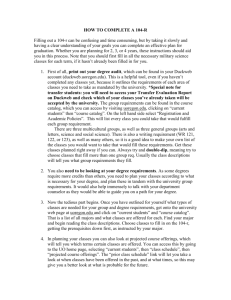Computer and Network Security Certification Program
advertisement

ENMU-Ruidoso Information Systems Associate Applied Science Degree Program(s) and Certificates COURSE Portales BS Information Systems IS 101 Computer Technical Support Essentials IS 102 Computer Technician’s Practical Applications IS 131 Network Security Fundamentals IS 136 Guide to Disaster Recovery IS 140 Introduction to WEB Design and Management IS 142 Web Authoring IS 143 Web Editing Tools IS 151 Computer Basics IS 153 Introduction (Foundations) of Information Systems IS 160 Overview of Operating Systems & Utilities IS 170 Systems Analysis & Design IS 241 XML Language’s IS 242 Web Scripting and Applications Development IS 253 Firewalls and How They Work IS 257 Network Defense and Counter Measures IS 258 Cyber Ethics, Professionalism, and Career Development IS 259 Computer Forensics IS 268 Workshop in Computer Information Systems IS 270 Data and Information Management IS 281 Spreadsheets and Data Analysis IS 285 IT Project Management IS 287 Application Development IS 289 Internship IS 290 IT Security and Risk Management IS 292 Decision Support Systems for Cyber Operations IS 293 Topics in Computing Systems - E.G. SCADA Cyber Forensics Computer Science 1 Cyber Security Computer & PC Support Network Technician Certification Certification ENMU-Ruidoso Information Systems Associate Applied Science Degree Program(s) and Certificates CS 123 Programming Fundamentals CS 234 Intermediate Programming General Ed Bus 201 Business Communications Mgmt 201 Principles of Management Comm 101 Interpersonal Communications English 102 English Composition English 133 Writing for Technical Professionals Math 119 College Algebra UNIV 101 Freshman Seminar Science: (4 Hours) Bio 113/Lab Chem 121/Lab Phys 151/Lab(Required for Cyber Security transfer to NM Tech) Social Science (3 Hours) Bus 151 Introduction to Business(Required for PC Tech Cert) Phy 101 Introduction Psychology Econ 221 Principles of Macro Economics Soc 101 Introduction Sociology Related: MATH 221, Formal Logic and Discrete Mathematics Math 283, Introduction to Applied Statistics TOTAL HOURS: 64 64 2 15 15 ENMU-Ruidoso Information Systems Associate Applied Science Degree Program(s) and Certificates Career Track Program Descriptions Portales BS COMPUTER TECHNOLOGY/Information Systems Associate of Applied Science Degree 67 credit hours The Computer Technology program is a two-year career-technical course of study culminating in an Associate of Applied Science degree at ENMURuidoso and will transfer into a Bachelor of Applied Arts and Sciences (BAAS) degree at ENMU-Portales. It offers the student a broad foundation of computer technology skills including hardware, operating systems and applications courses. The objectives of the program include: Improving Organizational Processes-- understanding and improving organizational processes is one of the key capabilities of all IS graduates. Exploiting Opportunities Created by Technology Innovations--graduates of Information Systems programs should be experts in seeing how organizations can benefit from technology capabilities, converting opportunities created by information technology innovations into sustainable organizational value through systematic processes. Designing and Managing Enterprise Architecture--Information Systems graduates should be experts in high level design and management of IT capabilities that are fully aligned with general organizational goals. Securing Data and Infrastructure-- Understanding these threats and identifying high-level solutions to protecting the organization are essential capabilities of all graduates of Information Systems degree programs. Understanding, Managing and Controlling IT Risks--IS graduates should have strong capabilities in understanding, managing, and controlling organizational risks that are associated with the use of IT-based solutions (e.g., security, disaster recovery, obsolescence, etc.). Information Systems Specific Knowledge and Skills-- Identifying and designing opportunities for IT-enabled organizational improvement, Analyzing trade-offs, Designing and implementing information systems solutions, and Managing ongoing information technology operations. Foundational Knowledge and Skills—Students will demonstrate Leadership and collaboration, Communication skills, Negotiation skills, Analytical and critical thinking, including creativity and ethical analysis, and Mathematical foundations. Knowledge and Skills Related to Domain Fundamentals-- The most common domain for Information Systems is business in general, but many other domains are possible components, including business specialties (such as accounting or finance), government, health care, the legal profession and non-governmental organizations. 3 ENMU-Ruidoso Information Systems Associate Applied Science Degree Program(s) and Certificates Information Security and Risk Information Systems Computer/Network and Cyber Security Associate of Applied Science Degree 67credit hours The Computer Technology program is a two-year career-technical course of study culminating in an Associate of Applied Science degree at ENMURuidoso and may transfer into a Bachelor of Applied Arts and Sciences (BAAS) degree at a four-year university. It offers the student a foundation of computer technology skills in computer, network and cyber security courses. This program is specifically designed to prepare students as entrylevel Computer/Networking and Cyber Security Technicians to meet the needs of current and future employer requirements. Students will learn critical security principles that enable them to plan, develop, and perform security tasks. The course will address hardware, software, processes, communications, applications, and policies and procedures with respect to organizational IT Security and Risk Management. The program Objectives will provide students with the following skills: Plan, analyze, develop, implement, maintain, and enhancing information systems security programs, policies, procedures, and tools to ensure the confidentiality, integrity, and availability of systems, networks, and data. Implement higher-level security requirements; integrate security programs across disciplines; define security plans and policies; assess new system design methodologies to improve software quality; and institute measures to ensure awareness and compliance. Assess new security technologies and/or threats and recommend changes; review and evaluate security incident response policies; and develop long-range plans for IT security systems. Resolve integration issues related to the implementation of new systems with the existing infrastructure. 4 ENMU-Ruidoso Information Systems Associate Applied Science Degree Program(s) and Certificates PC Support Technician Certificate of Completion 15 credit hours The following certificate prepares the student to enter the field of personal computer systems support. Upon completion of this certificate, the student may choose to complete either the CompTIA A+ Computer Service Technician or the Microsoft Certified Desktop Support Technician exam. To successfully complete either exam, the student needs a minimal amount of additional, specialized training depending upon which exams they choose to pursue. BUS 151 Introduction to Business-3 or CAS 241 Business Mathematics-3 IS 101/101L Fundamentals of Computer Hardware and software Software/Lab- 4 hours IS 110 Operating Environments-3 IS 153 Introduction (Foundations) of Information Systems - 3 The objectives of the program include: • • • • • • Students have the ability to perform tasks such as installation, configuration, diagnostics, preventive maintenance and basic networking. Student has understanding and application of security, safety and environmental issues and communication and professionalism. Student has knowledge of basic computer hardware and operating systems, covering skills such as installation, building, upgrading, repairing, configuring, troubleshooting, optimizing, diagnosing and preventive maintenance with additional elements of security and soft skills. Student will have knowledge to validate the basic skills needed by any entry-level service technician regardless of job environment. Successful students will have in-depth knowledge of PC workstations and peripherals including skills required to install, configure, upgrade, and maintain PC workstations, the Windows OS and SOHO networks. Students will have knowledge to utilize troubleshooting techniques and tools to effectively and efficiently resolve PC, OS, and network connectivity issues and implement security practices. 5 ENMU-Ruidoso Information Systems Associate Applied Science Degree Program(s) and Certificates Computer and Network Security Certification Program Certificate of Completion 15 credit hours This program is specifically designed to prepare students as entry-level Computer/Networking Security Technicians or provide current Information Systems professionals with an Information Systems security certification to meet the needs of current and future employer requirements. Upon completion of this program students will be receive a university certification of completion and prepared and encouraged to take the CompTIA Security+ test to receive the industry certifications. The objectives of the program include: Students are capable of plan, analyze, develop, implement, maintain, and enhancing information systems security programs, policies, procedures, and tools to ensure the confidentiality, integrity, and availability of systems, networks, and data. Students will have the knowledge to implement higher-level security requirements; integrate security programs across disciplines; define security plans and policies; assess new system design methodologies to improve software quality; and institute measures to ensure awareness and compliance. Students will have the knowledge to assess new security technologies and/or threats and recommend changes; review and evaluate security incident response policies; and develop long-range plans for IT security systems. Students will have understanding and knowledge to resolve integration issues related to the implementation of new systems with the existing infrastructure. 6 ENMU-Ruidoso Information Systems Associate Applied Science Degree Program(s) and Certificates Course Descriptions Title: IS 101 Computer Technical Support Essentials (3) Credits Core Course Catalog description The Essentials class will cover a wide range of skills for the student, which will prepare them for a position as a technical support technician. This course covers troubleshooting most every manner of hardware and software problem that a helpdesk operator might need. From booting the machine or workstation, to helping the user or client login to a secure network, the student will gain the knowledge to ask the right questions in order to help the end user in the most efficient and professional manner possible. Title: IS 102 Computer Technician’s Practical Applications (3) Credits Core Course Catalog description The Practical Applications class will give the technician the hands-on experience with equipment and hardware that most companies and businesses are likely to have on a network environment. The student will learn best practices and procedures for almost any user or operator workstation or peripherals, from printers to secure network connections. Students will have the opportunity to build or rebuild a workstation computer, in order to gain a better understanding of how digital information flows within the multiple components. Title: IS 131 COMPUTER AND SECURITY FUNDAMENTALS. (3) Credits Core Course Catalog description A comprehensive overview of network security concepts that include: remote access, e-mail, the Web, directory and file transfer, wireless data, common network attacks, cryptography, operational/organizational security, disaster recovery, business continuity, and Cyber Ethics. Title: IS 136 GUIDE TO BUSINESS CONTINUITY AND DISASTER RECOVERY (3) Credits Core Course Catalog description Presents methods to identify vulnerabilities and take appropriate countermeasures to prevent and mitigate failure risks for an organization. It will take an enterprise-wide approach to developing a disaster recovery plan. Title: IS 140 - Introduction to WEB Design and Management. (3) Credits Core Course 7 ENMU-Ruidoso Information Systems Associate Applied Science Degree Program(s) and Certificates Catalog description This course focuses on creating and managing Web sites, the tasks and tools involved in building and maintaining a WEB site, and the WEB administrator’s roles and responsibilities and challenges. Title: IS 141 - WEB Authoring (Script Language) (3) Credits Core Course Catalog description The course explorers the complete set of Web authoring skills using HTML and/or other scripting languages. The topics covered in this course includes links, backgrounds, controlling text and graphic placement, tables, image maps, frames, and forms. Title: IS 142 - WEB Editing Tools (3) Credits Core Course Catalog description This course provides tools used for designing and building WEB pages that are easy to use and have a pleasing look. The student will develop WEB pages using a WEB page development program. The use of images, forms, frames, tables, templates, and layers will be covered in this course. Title: IS 151 Computer Basics (3) Credits Core Course Catalog description This course covers microcomputer operations; terminology, concepts and applications including Microsoft Access, Excel, Internet Explorer, PowerPoint, and Word. Students who do not have a working knowledge of the computer keyboard and mouse should take a keyboarding course before registering for this class. Title: IS 153 Introductions (Foundations) of Information Systems (3) Credits Core Course Catalog description Information systems are an integral part of all business activities and careers. This course is designed to introduce students to contemporary information systems and demonstrate how these systems are used throughout global organizations. The focus of this course will be on the key components of information systems - people, software, hardware, data, and communication technologies, and how these components can be integrated and managed to create competitive advantage. Through the knowledge of how IS provides a competitive advantage students will gain an understanding of how information is used in organizations and how IT enables improvement in quality, speed, and agility. This course also provides an introduction to systems and development concepts, technology acquisition, and various types of application software that have become prevalent or are emerging in modern organizations and society. Title: IS 160 Overview of Operating Systems and Utilities (3) Credits Core Course Catalog description 8 ENMU-Ruidoso Information Systems Associate Applied Science Degree Program(s) and Certificates This course is an overview of computer operating systems from PCs to mainframes. Including OS theory and structure as well as an introduction to systems control parameters, utilities, services and command language. Prerequisite: IS 153. Title: IS 170 Systems Analysis & Design (3) Credits Core Course Catalog description This course discusses the processes, methods, techniques and tools that organizations use to determine how they should conduct their business, with a particular focus on how computer-based technologies can most effectively contribute to the way business is organized. The course covers a systematic methodology for analyzing a business problem or opportunity, determining what role, if any, computer-based technologies can play in addressing the business need, articulating business requirements for the technology solution, specifying alternative approaches to acquiring the technology capabilities needed to address the business requirements, and specifying the requirements for the information systems solution in particular, in-house development, development from third-party providers, or purchased commercial-off-the-shelf (COTS) packages . Title: IS 241 XML Language’s (3) Credits Core Course Catalog description This course provides students with an introduction to the XML language’s structure and syntax. The course examines supporting tools such as XSL and CSS. This course examines the possibilities of using XML with popular technologies such as JAVA SAX, SOAP, RDF, and the DOM. Title: IS 242 - WEB Scripting and Application Development (3) Credits Core Course Catalog description This course explores the complete set of WEB scripting skills needed to develop WEB applications. The course content includes variables, data types, arithmetic operations, logical operations, looping, creating and reading cookies, creating an array, displaying data based on cookie valus, setting flags, working with frames, creating objectives in a hidden frame, using History Object, writing HTML to another window, determining browser and detecting keystrokes. Title: IS 250 IT Infrastructure (3) Credits Core Course Catalog description This course provides an introduction to IT infrastructure issues for students majoring in Information Systems. It covers topics related to both computer and systems architecture and communication networks, with an overall focus on the services and capabilities that IT infrastructure solutions enable in an organizational context. It gives the students the knowledge and skills that they need for communicating effectively with professionals whose special focus is on hardware and systems software technology and for designing organizational processes and software solutions that require in-depth understanding of the IT infrastructure capabilities and limitations. It also prepares the students for organizational roles that require interaction with external vendors of IT infrastructure components and solutions. The course focuses strongly on Internet-based solutions, computer and network security, business continuity, and the role of infrastructure in regulatory compliance. Title: IS 253 FIREWALLS AND HOW THEY WORK (3) Credits Core Course 9 ENMU-Ruidoso Information Systems Associate Applied Science Degree Program(s) and Certificates Catalog description This course introduces students to the design and implementation of firewalls. The course covers such topics as firewalls using CISCO Routers, Microsoft server platform and UNIX platform. Focuses on how firewalls function in these environments and the basic steps to plan and implement firewalls. PREREQUISITE: IS 131 or Instructor’s permission. Title: IS 257 COMPUTER AND NETWORK DEFENSE AND COUNTER MEASURES (3) Credits Core Course Catalog description This course examines the tools, techniques and technologies used in the technical securing of information assets. Students will receive in-depth information about the software and hardware components of Information Security and Assurance. PREREQUISITE: IS 131 Title: IS 258 CYBER ETHICS, PROFESSIONALISM, AND CAREER DEVELOPMENT (3) Credits Core Course Catalog description This course exposes the student to the topic of Cyber Ethics, Professionalism, and Career Development. The course provides students seeking a career in Cyber Security insight on professional behavior required in a security job and how to develop a professional career in Cyber Security. IS 259 COMPUTER FORENSICS (4) Credits Core Course Catalog description This course exposes the student to the topic of Computer Forensics and Investigation. The course provides the student with methods to properly conduct a computer forensics investigation beginning with a discussion of ethics. Topics covered include fundamental concepts, history of computing forensics, file structures, data recovery techniques, computer forensic tools, analysis and application. The objectives of this course map to International Association of Computer Investigative Specialist (IACIS). Title: IS 268 – Workshop in Computer Information Systems (1-9) Credits Core Course Catalog description As announced. (This course may be repeated for credit) Title: IS 270 Data and Information Management (3) Credits Core Course Catalog description This course provides the students with an introduction to the core concepts in data and information management. It is centered around the core skills of identifying organizational information requirements, modeling them using conceptual data modeling techniques, converting the conceptual data models into relational data models and verifying its structural characteristics with normalization techniques, and implementing and utilizing a relational database using an industrial-strength database management system. The course will also 10 ENMU-Ruidoso Information Systems Associate Applied Science Degree Program(s) and Certificates include coverage of basic database administration tasks and key concepts of data quality and data security. In addition to developing database applications, the course helps the students understand how large-scale packaged systems are highly dependent on the use of DBMSs. Building on the transactional database understanding, the course provides an introduction to data and information management technologies that provide decision support capabilities under the broad business intelligence umbrella. Title: IS 272 Introduction to Human-Computer Interaction (3) Credits Elective Course Catalog description This course provides an introduction to the field of human-computer interaction (HCI), an interdisciplinary field that integrates cognitive psychology, design, computer science and others. Examining the human factors associated with information systems provides the students with knowledge to understand what influences usability and acceptance of IS. This course will examine human performance, components of technology, methods and techniques used in design and evaluation of IS. Societal impacts of HCI such as accessibility will also be discussed. User-centered design methods will be introduced and evaluated. This course will also introduce students to the contemporary technologies used in empirical evaluation methods. Title: IS 281 Spreadsheets and Data Analysis (3) Credits Elective Course Catalog description Evaluation of and advanced applications of electronic spreadsheets. Basic concepts of business statistics, data analysis, and management science integrated in a contemporary spreadsheet environment. The course emphasizes practical applications and business decision making. Prerequisites: STAT 213 Title: IS 282 Business Process Management (3) Credits Elective Course Catalog description In this course students will be introduced to key concepts and approaches to business process management and improvement. The main focus of this course is both understanding and designing business processes. Students will learn how to identify, document, model, assess, and improve core business processes. Students will be introduced to process design principles. The way in which information technology can be used to manage, transform, and improve business processes is discussed. Students will be exposed to challenges and approaches to organizational change, domestic and offshore outsourcing, and inter-organizational processes. Title: IS283 IT Audit and Controls(3) Credits Elective Course Catalog description This course introduces the fundamental concepts of the information technology audit and control function. The main focus of this course is on understanding information controls, the types of controls and their impact on the organization, and how to manage and audit them. The concepts and techniques used in information technology audits will be presented. Students will learn the process of creating a control structure with goals and objectives, audit an information technology infrastructure against it, and establish a systematic remediation procedure for any inadequacies. The challenge of dealing with best practices, standards, and regulatory requirements governing information and controls is addressed. 11 ENMU-Ruidoso Information Systems Associate Applied Science Degree Program(s) and Certificates Title: IS 284 Innovation and New Technologies (3) Credits Elective Course Catalog description New IS technologies are being used to change how organizations operate, produce products and services, and communicate both internally and as well as with external partners. This course is designed to introduce students to new and innovative technologies and examine how these powerful systems have fundamentally reshaped modern organizations along with our society. Using online collaborative technologies that were developed in the context of social networking and online communities, corporations are reengineering both internal business processes and those related to customers, suppliers, and business partners. Developing innovative ways to communicate and collaborate can lead to new business opportunities, and new efficiencies. This course investigates the technologies, methods and practices of developing new innovations such as online communities, and how this knowledge and these skills are applied to reengineer business processes. For example, how products, services and information systems are developed, and how geographically disperse virtual teams collaborate. Title: IS 285 IS Project Management (3) Credits Core Course Catalog description This course discusses the processes, methods, techniques and tools that organizations use to manage their information systems projects. The course covers a systematic methodology for initiating, planning, executing, controlling, and closing projects. This course assumes that project management in the modern organization is a complex team based activity, where various types of technologies (including project management software as well as software to support group collaboration) are an inherent part of the project management process. This course also acknowledges that project management involves both the use of resources from within the firm, as well as contracted from outside the organization. Title: IS 287 Application Development (3) Credits Elective Course Catalog description The purpose of this course is to introduce the students to the fundamental concepts and models of application development so that they can understand the key processes related to building functioning applications and appreciate the complexity of application development. Students will learn the basic concepts of program design, data structures, programming, problem solving, programming logic, and fundamental design techniques for event-driven programs. Program development will incorporate the program development life cycle: gathering requirements, designing a solution, implementing a solution in a programming language, and testing the completed application. Title: IS 289 Internship (1-9) Credits Elective Course Catalog description Students working in a related field may receive one credit per 60 hours of approved job experience. Job approval is determined by instructor/departmental review and course crdit may require additional projects or assignment. 12 ENMU-Ruidoso Information Systems Associate Applied Science Degree Program(s) and Certificates Title: IS 290 IT Security and Risk Management (3) Credits Elective Course Catalog description This course provides an introduction to the fundamental principles and topics of Information Technology Security and Risk Management at the organizational level. Students will learn critical security principles that enable them to plan, develop, and perform security tasks. The course will address hardware, software, processes, communications, applications, and policies and procedures with respect to organizational IT Security and Risk Management. Title: IS 293 IT Topics in Computer Information Systems (1 - 9) Credits Elective Course Catalog description As announced. (This course may be repeated for credit with consent of instructor and administrative approval). 13






